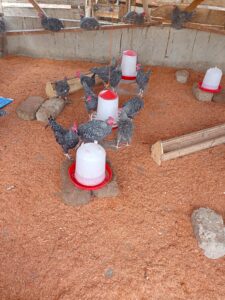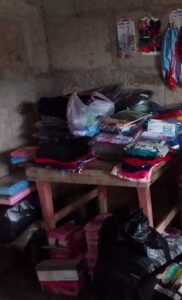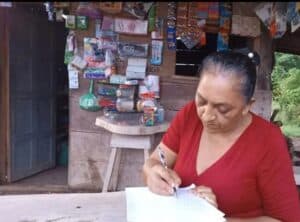
Progress Report: Growing Healthy Food, Growing Healthy Children

Mothers participating in the program holding up their orange-fleshed sweet potato vines.
By Mary Jane Oakland, PhD
Since I last wrote to you just after returning from Ghana in February, Self-Help’s team in Ghana wasted no time in implementing the multi-faceted intervention to improve the nutritional/health odds for the youngest, most vulnerable in the village of Beposo. Good nutrition during the first 1000 days (from conception to about 2 years) is critical for cognitive and physical development that will either help or impede children for the rest of their lives. We knew that achieving zero stunting in a sustainable way would require the collaboration of our ag team, our micro-credit experts, and trained nutritionists to address what and how much food is grown in the village, and to shape how infants and young children are fed during pregnancy, infancy, and through the perilous transition from nature’s perfect food (breastmilk) to table food.
Under Benjamin Kusi’s leadership, our team in Ghana gathered the commitment of the village leaders and the husbands of pregnant and lactating mothers in Beposo. By the end of February, 50 women were enrolled and participating twice a week in nutrition education, support and counseling offered by SHI staff nutritionist, Jesse Jackson Sarkodie.
In September, it was my privilege to return to Ghana, with Self-Help Executive Director, Nora Tobin, and fellow board member, Jerry Perkins. I had been in regular communication with Jesse by phone and email, and knew that we were making progress toward our goal of ensuring that all children born during this intervention were at the 15th percentile or above on the growth chart in terms of length-for-age. Still, when I visited in person, I was amazed at how much the Ghana team has accomplished in 8 months!
Among the 50 women initially enrolled in February, 16 were pregnant and 34 had children under the age of 2. Since then, there have been 16 live births, including one set of twins. There were medical complications resulting in two deaths among the newborns. For the 14 infants, 13 are on track to meet the goal that all children are gaining weight and height appropriately by the time they are 2 years of age. For the other children, born before the program started, but younger than 2 years, 88% are on target to meet the program goal of no child stunted by two years old. For seven of the babies and toddlers, we’ve reached into our “nutrition toolkit” to improve growth with further support. For a village where the stunting levels have been between 25% – 30%, this is a remarkable improvement! What it tells us: in just eight months, this additional nutritional support is already making a difference!
The local nurse assigned to this community reported that rural women rarely seek prenatal or antenatal care at the health clinic

Adwoa tastes sweet potato for the first time!
unless the child is experiencing an obvious illness. It takes a full day’s journey and considerable portion of the daily budget to travel to the clinic, and the concept of preventative care is quite foreign, even though most pregnant women have health insurance that covers the costs of such care. But since the start of our intervention, prenatal and antenatal preventative care visits by the women are nearly on target with the recommendations. This is a huge shift in behavior, which she credits to the program.
I mentioned that perilous transition from exclusive breastfeeding to consuming table food, and that is where our agriculture and micro-credit teams work with the villages. Few of the households have enough food to feed the entire family on a regular basis, and that what they do consume tends to be from just one or two food groups. In order to increase both household food security and dietary diversity, Self-Help’s ag team is implementing agricultural training, demonstration plots, and on-farm advising to support mothers to grow more nutritious food. These foods include quality protein maize (QPM) intercropped with cowpeas or ground nuts to increase plant-based protein consumption, orange-fleshed sweet potatoes (OFSP) which are high in Vitamin A, and raising chickens (layers) for eggs to increase animal-based protein consumption. All of these foods can be made into appropriate weaning supplements such as porridge, sweet potato mash, and hard-boiled eggs so moms can meet the needs of their growing babies.
As with any program, there are early adopters and those who follow. Felicia was the first mom to plant OFSP during the major season. In September, she shared her experiences growing OFSP for her weaning son Amos with the other women in the program. It peaked the interest of many more women, and we promised that if they would prepare the mounds in their gardens for growing the OFSP, Self-Help would supply them with vines and instructions for growing in the minor season. Look at joy on the faces of the mothers the day the vines were distributed! They’ve now planted, so before harvest, Self-Help will host a cooking demonstration training session to teach women different ways to prepare the OFSP to feed to their families.
This is not a one-size-fits-all approach, and not all of these interventions will be appropriate for all women. The goal is to ensure that there is a supply of QPM, cowpea, groundnut, OFSP, and eggs available in the village for women to either produce or buy. For those who are unable to access farmland, Self-Help is teaching them how to manage their own small businesses to generate income to buy the food from their neighbors. We have already seen that the moms participating in Self-Help’s micro-credit program have the resiliency to respond to acute illnesses and unplanned needs for their children. The women are particularly excited about rearing their own poultry for food and income, and that will happen very soon once they have completed the necessary training to be set up to succeed.
Thank you to all who have made this program possible to date – it is truly granting the children the ability to learn and earn long-term!
Help us make child stunting and malnutrition a thing of the past in another village!
The team in Ghana is poised and ready to take this successful intervention to serve mothers and babies in nearby villages where stunting and malnutrition are chronic problems. Here’s how you can help:
In December, we’ll have the first “graduation.” Mothers whose children have turned two will be given a board book to encourage literacy. Donate a new board book appropriate for a two-year-old, or make a gift of $5 to sponsor one as a “graduation” gift!
Donations can be mailed to 207 20th Street NW Suite A, Waverly, IA 50677. They can also be made over the phone at 319-352-4040, or online here.
Read the results of the random control trial on which this program is based: Marquis, Grace, et al. “An Agriculture-Nutrition Intervention Improved Children’s Diet and Growth in a Randomized Control Trial in Ghana.” Maternal Child Nutrition, ser. 3, 2018. 3.
Dr. Mary Jane Oakland is an emeritus professor of Food Science and Human Nutrition at Iowa State University. She has served on the Self-Help International Board of Directors since 2006.

 Previous Post
Previous Post


